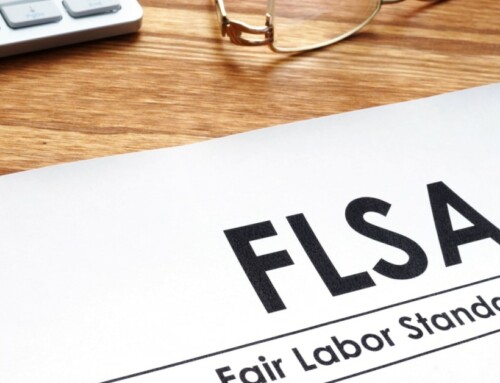On December 27, 2020, the President signed a $900 billion stimulus bill into law. While the $600 direct payments to individuals and the eviction moratorium have received much coverage in the news, the bill also contains a handful of items employers need to know about. Here is a summary:
No Extension of Emergency Paid Sick Leave or Expanded FMLA
The Families First Coronavirus Relief Act, or FFCRA, passed in March 2020, provided for mandatory paid sick leave for employees of firms with fewer than 500 employees for absences necessitated by COVID-19. The FFCRA also expanded FMLA to cover and provide pay for absences related to the closure of schools or lack of childcare due to COVID-19. Covered private employers were allowed a refundable tax credit against payroll taxes owed in the amount of mandatory paid leave they provided. (For more information about the FFCRA, please see our article on the topic.)
The FFCRA expires December 31, 2020, and the new stimulus bill does not extend its mandatory leave requirements. However, the new law does extend the payroll tax credit through March 31, 2021. This means that private employers with fewer than 500 employees may continue to receive a tax credit for eligible paid leave that they provide from January 1 through March 31, 2021, but employers are not required to offer the leave. In addition, it appears that if an employee has already used their allotment of FFCRA leave, covered employers would not be allowed to claim further tax credits for providing more leave for the employee after December 31, 2020.
Unemployment Assistance Extended
The CARES Act passed earlier in 2020 provided for $600 per week of additional unemployment benefits for workers who were out of work. Additional funds were made available for $300 per week over the summer when the $600 benefit expired. The new stimulus bill extends that benefit through March 14, 2021. This benefit is on top of the amount that the state’s unemployment compensation program normally pays.
The law also extends Pandemic Unemployment Assistance, which allows certain part-time and gig workers – who do not normally qualify for unemployment assistance – to receive benefits. The extension is for an additional 11 weeks, and requires applicants to provide documentation of their employment or self-employment within 21 days of applying for the benefits. Pandemic Emergency Unemployment Compensation, which extends the normal period an individual can receive unemployment, was also passed in the stimulus bill. Workers who have exhausted their regular benefits may experience a gap in the extension due to the timing of the President’s signing the stimulus bill.
Paycheck Protection Program Expanded
The popular Paycheck Protection Program, or PPP, received a new infusion of cash and an allowance for second PPP loans. Small businesses (those with fewer than 300 employees) that have used up their first PPP loan can apply for a second forgivable PPP loan if they can demonstrate a reduction of at least 25% in gross receipts during the first, second, or third quarter of 2020 relative to the same quarter of 2019. In addition, new provisions are intended to serve small businesses, non-profits, and independent restaurants. Reversing a previous IRS determination, the stimulus bill clarifies that expenses covered by forgivable PPP loans may be deducted as business expenses on businesses’ federal tax returns.
Questions About the New Stimulus Bill?
If you have questions about how the provisions in the new law will affect your rights and obligations as an employer, please contact our South Carolina employer lawyers at Gignilliat, Savitz & Bettis, LLP.






